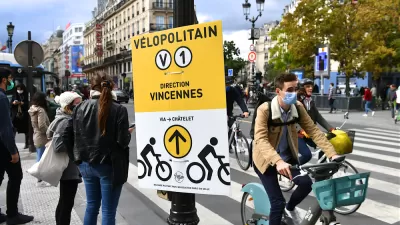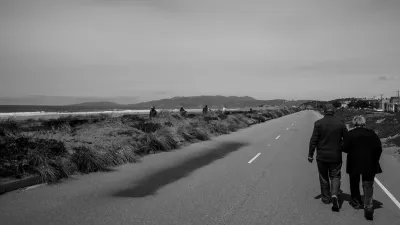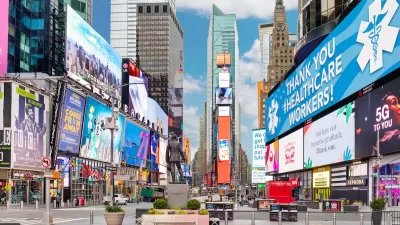Although the project has been hugely successful with local residents, the mayor and some county supervisors wanted to revert the road to vehicle use.

The "Great Walkway," a "pedestrian paradise" created in San Francisco during the pandemic, reopened to cars on August 16. An article written by Heather Knight describes the former 17-acre park, converted to a car-free promenade in April 2020, as "one of the few silver linings to emerge from the COVID-19 pandemic." Since then, "[a] city study found it was incredibly popular — drawing 126,000 visitors each month, including 3,240 each weekday," and 53% of respondents to a survey wanted the change to remain permanent. "The city also rightly responded to neighbors’ concerns about increased traffic on their streets, installing stop signs, speed humps and traffic diverters" on adjacent roads.
Now, in a surprise move that angered mobility advocates, the city's mayor and three county supervisors have "privately decided" to reopen the Great Highway to cars five days a week, citing concerns about access to schools. But "[i]n a city that has 1,200 miles of roads for cars, devoting a small fraction to pedestrians and bicyclists isn’t too much to ask," argues Knight. "If giving 2 miles of the Great Highway to people two days a week is a compromise, as the mayor says, that’s a strange definition."
Before the reopening, close to 600 residents gathered to protest the reopening of the street. The San Francisco Bicycle Coalition said in a statement that the organization "continues to firmly believe that the Great Highway should be a park and be car-free 24/7." Meanwhile, "three city residents on Tuesday planned to file a California Environmental Quality Act appeal in an attempt to block the return of the roadway to vehicles," arguing that putting cars–along with their polluting emissions–back on the street merits an environmental review.
FULL STORY: Sadly, S.F. getting ready to reopen Great Highway - a pedestrian 'paradise' during pandemic

Alabama: Trump Terminates Settlements for Black Communities Harmed By Raw Sewage
Trump deemed the landmark civil rights agreement “illegal DEI and environmental justice policy.”

Study: Maui’s Plan to Convert Vacation Rentals to Long-Term Housing Could Cause Nearly $1 Billion Economic Loss
The plan would reduce visitor accommodation by 25% resulting in 1,900 jobs lost.

Planetizen Federal Action Tracker
A weekly monitor of how Trump’s orders and actions are impacting planners and planning in America.

Wind Energy on the Rise Despite Federal Policy Reversal
The Trump administration is revoking federal support for renewable energy, but demand for new projects continues unabated.

Passengers Flock to Caltrain After Electrification
The new electric trains are running faster and more reliably, leading to strong ridership growth on the Bay Area rail system.

Texas Churches Rally Behind ‘Yes in God’s Back Yard’ Legislation
Religious leaders want the state to reduce zoning regulations to streamline leasing church-owned land to housing developers.
Urban Design for Planners 1: Software Tools
This six-course series explores essential urban design concepts using open source software and equips planners with the tools they need to participate fully in the urban design process.
Planning for Universal Design
Learn the tools for implementing Universal Design in planning regulations.
Caltrans
Smith Gee Studio
Institute for Housing and Urban Development Studies (IHS)
City of Grandview
Harvard GSD Executive Education
Toledo-Lucas County Plan Commissions
Salt Lake City
NYU Wagner Graduate School of Public Service





























